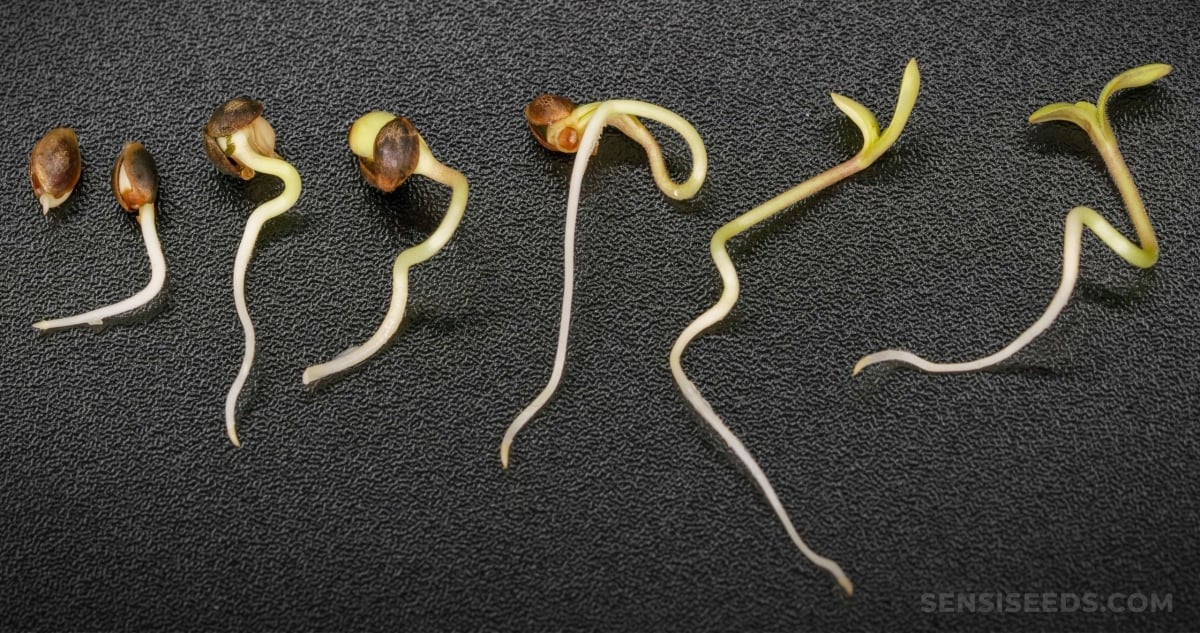

Germinating cannabis seeds correctly is essential for a few key reasons:
Ensuring Healthy Seedling Development: Proper germination lays the foundation for strong, vibrant seedlings that can thrive throughout the entire growing process. Poorly germinated seeds often result in weak, stunted plants that struggle to reach their full potential.
Maximising Yield and Potency: When cannabis seeds are germinated correctly, the resulting plants are more likely to produce abundant, high-quality harvests with optimal cannabinoid and terpene profiles.
Saving Time and Resources: By mastering the art of germination, you can avoid the frustration and wasted time that comes with failed attempts, allowing you to focus your efforts on the subsequent stages of cultivation.
The Basic Requirements for Germinating Cannabis Seeds.
Before we dive into the specifics of germination methods, it's essential to understand the fundamental requirements for successfully germinating cannabis seeds. These include:
Moisture: Cannabis seeds require a consistently moist environment to germinate effectively. They should never be allowed to dry out during the process.
Warmth: The optimal temperature range for germinating cannabis seeds is typically between 20-25°C (68-77°F). Cooler temperatures can slow or even prevent germination.
Darkness: Cannabis seeds germinate best in a dark environment, as light can inhibit the process.
Air Circulation: Providing a gentle airflow around the seeds can help prevent the growth of mould or bacteria, which can hinder germination.
By ensuring these basic requirements are met, you'll be well on your way to cultivating a thriving crop of cannabis plants.
Different Germination Methods for Cannabis Seeds.
There are several effective methods for germinating cannabis seeds, each with its own advantages and considerations. Let's explore the most common approaches:
Paper Towel Method:
Place the seeds between two moist (not soaked) paper towels.
Fold the paper towels and place them in a dark, warm location, such as a drawer or cupboard.
Check the seeds daily, misting the paper towels with water as needed to maintain moisture.
Once the seeds have sprouted, carefully transfer them to your growing medium.
Soil Germination:
Fill a small container (such as a seed tray or pot) with a high-quality, well-draining seed starting mix.
Plant the seeds approximately 1-2 cm (0.5-1 inch) deep in the soil.
Lightly mist the soil to keep it consistently moist, but not waterlogged.
Cover the container with a clear dome or plastic wrap to maintain humidity.
Place the container in a warm, dark location until the seeds germinate.
Germination Cubes or Plugs:
Use specialised germination cubes or plugs designed for cannabis seeds.
Follow the manufacturer's instructions for proper hydration and placement of the seeds.
These pre-made growing mediums often provide optimal conditions for rapid and reliable germination.
Hydroponics or Rockwool:
For more advanced growers, germinating seeds in a hydroponic setup or using Rockwool cubes can be an effective method.
This approach requires a bit more technical knowledge but can result in exceptionally vigorous seedlings.
Regardless of the method you choose, it's essential to monitor the seeds closely and make adjustments as needed to maintain the optimal germination conditions.
Essential Tips for Successful Germination.
To ensure the best possible outcomes when germinating your cannabis seeds, consider the following essential tips:
Use High-Quality Seeds: Start with fresh, viable cannabis seeds from a reputable source. Avoid using old or damaged seeds, as they are less likely to germinate successfully.
Soak Seeds Before Germination: Soaking the seeds in water for 12-24 hours before germination can help soften the outer shell and kickstart the germination process.
Maintain Consistent Moisture: Regularly check the germination environment and mist or water the seeds as needed to keep the medium consistently moist, but not waterlogged.
Provide Adequate Warmth: Use a heating pad or place the germination container in a warm, draft-free location to maintain the optimal temperature range.
Avoid Disturbing the Seeds: Minimise handling the seeds during the germination process, as this can disrupt the delicate process and damage the emerging taproot.
Label and Track Your Seeds: Keep detailed records of the strain, germination date, and any other relevant information to monitor the progress of your seeds.
Sterilise Your Equipment: Clean and sterilise all germination containers, tools, and growing media to prevent the introduction of mould, bacteria, or pests that could hinder germination.
By following these essential tips, you'll be well on your way to successfully germinating your cannabis seeds and laying the foundation for a thriving grow.
Choosing the Right Cannabis Seeds for Germination.
When it comes to germinating cannabis seeds, the quality and genetics of the seeds you choose can make a significant difference in the outcome. Here are some factors to consider when selecting the right cannabis seeds:
Strain Selection: Choose cannabis strains that align with your growing goals, whether you're aiming for high yields, specific cannabinoid profiles, or particular growth characteristics.
Seed Source: Purchase your seeds from a reputable, licensed vendor to ensure they are of high quality and free from contaminants.
Seed Freshness: Opt for the freshest seeds possible, as older seeds may have reduced viability and germination rates.
Seed Appearance: Healthy cannabis seeds should have a solid, dark brown or black colour, and a smooth, shiny appearance. Avoid seeds that are cracked, discoloured, or appear damaged.
Seed Size: While size isn't the sole indicator of seed quality, larger, plumper seeds generally have a higher chance of successful germination.
By carefully selecting your cannabis seeds, you'll be setting yourself up for a more rewarding and productive growing experience.
Common Mistakes to Avoid When Germinating Cannabis Seeds.
Even with the best intentions and preparation, there are several common mistakes that can hinder the germination of your cannabis seeds. Being aware of these pitfalls can help you avoid them and improve your success rate:
Overwatering: Providing too much moisture can lead to the seeds becoming waterlogged, which can stunt or prevent germination altogether.
Underwatering: Allowing the germination medium to dry out can also halt the germination process and damage the delicate seedlings.
Inconsistent Temperatures: Fluctuations in temperature can disrupt the ideal conditions for germination, leading to uneven or failed results.
Inadequate Lighting: Exposing the seeds to too much light during the germination stage can inhibit the process and negatively impact the seedlings' development.
Improper Seed Depth: Planting the seeds too deep or too shallow in the growing medium can prevent them from breaking through the surface.
Contamination: Introducing pests, pathogens, or other contaminants to the germination environment can compromise the seeds' health and viability.
Impatience: Rushing the germination process or disturbing the seeds too frequently can damage the delicate taproot and stall the germination.
By being mindful of these common pitfalls and taking the necessary precautions, you can increase your chances of successfully germinating your cannabis seeds.
Troubleshooting Common Issues During Germination.
Despite your best efforts, you may occasionally encounter challenges during the germination process. Here are some common issues and strategies for troubleshooting them:
Slow or Delayed Germination:
Ensure the seeds are kept in a consistently warm environment (20-25°C/68-77°F).
Check that the germination medium is not too dry or waterlogged.
Consider soaking the seeds for 12-24 hours before germination.
If the seeds have not sprouted within 7-10 days, they may be non-viable or have been stored improperly.
Seedlings Failing to Emerge:
Verify that the seeds have been planted at the appropriate depth (1-2 cm/0.5-1 inch).
Ensure the growing medium is not compacted, as this can prevent the seedlings from breaking through.
Check for any signs of mould, bacteria, or pests that could be hindering the germination.
Weak or Stunted Seedlings:
Assess the growing medium for any nutrient imbalances or pH issues that could be affecting the seedlings' development.
Provide the seedlings with adequate lighting, as insufficient light can lead to etiolation and weakened growth.
Ensure the seedlings are not experiencing temperature extremes or significant fluctuations.
Damping-Off Disease:
This fungal infection can cause seedlings to collapse at the soil line, leading to their demise.
Improve air circulation around the seedlings and ensure the growing medium is not overly moist.
Consider using a fungicide or other antimicrobial treatment to combat the disease.
By addressing these common issues promptly and making the necessary adjustments, you can get your cannabis seeds back on track to a successful germination.
The Importance of Proper Lighting and Temperature During Germination.
Providing the right lighting and temperature conditions is crucial for the successful germination of your cannabis seeds. Let's dive deeper into the specifics:
Lighting:
Cannabis seeds require complete darkness during the germination process. Exposure to light can inhibit or even prevent the seeds from sprouting.
Once the seedlings have emerged, they will need access to an appropriate light source to support their growth and development.
Temperature:
The optimal temperature range for germinating cannabis seeds is between 20-25°C (68-77°F).
Temperatures outside of this range can slow down or halt the germination process altogether.
Maintaining a consistent temperature is key, as fluctuations can disrupt the delicate balance required for successful germination.
By carefully controlling the lighting and temperature conditions during the germination stage, you can create the ideal environment for your cannabis seeds to thrive and transition into healthy, vibrant seedlings.
Transplanting Seedlings After Germination.
Once your cannabis seeds have successfully germinated and the seedlings have emerged, the next crucial step is to transplant them into a larger growing medium. This process should be handled with care to minimise stress and disruption to the delicate plants. Here are some tips for transplanting your cannabis seedlings:
Timing: Wait until the seedlings have developed their first set of true leaves before transplanting. This typically occurs 7-14 days after germination.
Growing Medium: Prepare a well-draining, nutrient-rich potting mix or seed starting mix to transplant the seedlings into.
Transplant Containers: Choose appropriately sized containers, such as small pots or seed trays, to accommodate the seedlings' root systems.
Transplant Procedure: Gently lift the seedlings by the leaves or cotyledons (seed leaves), avoiding the delicate stem. Plant them at the same depth as they were growing in the germination medium.
Watering: Water the transplanted seedlings thoroughly, but avoid overwatering. Keep the soil consistently moist, but not waterlogged.
Acclimation: Place the transplanted seedlings in a warm, well-lit area and gradually expose them to longer periods of light over the course of a few days to help them acclimate.
By following these guidelines, you can ensure a smooth transition for your cannabis seedlings, setting them up for continued growth and development.
Conclusion and Final Thoughts on Germinating Cannabis Seeds.
In this comprehensive guide, we've explored the essential aspects of germinating cannabis seeds, from understanding the importance of the process to mastering the various germination methods and troubleshooting common issues. By applying the tips and strategies outlined here, you'll be well on your way to successfully germinating your cannabis seeds and laying the foundation for a thriving, productive grow.
Remember, the germination stage is a critical first step in the cannabis cultivation journey, and getting it right can make all the difference in the quality and yield of your final harvest. Remain patient, stay vigilant, and don't hesitate to experiment and adjust your approach as needed to find the germination method that works best for you and your growing environment.
If you're ready to take the next step in your cannabis growing journey, I encourage you to explore our wide selection of high-quality cannabis seeds. With a variety of strains and genotypes to choose from, you're sure to find the perfect fit for your growing goals. Visit our online store today and let's get your cannabis cultivation off to a strong start!


DISCLAIMER: To comply with UK law, Discount Cannabis Seeds sells Cannabis Seeds for souvenir and collection purposes only. Discount Cannabis Seeds accepts no liability for customers purchasing them for any other purposes.

Office Address:
PLEASE NOTE OUR BUSINESS IS ONLINE ONLY, NO SEEDS ARE FOR SALE AT OUR OFFICE ADDRESS
49 Station Road
Polegate
East Sussex
BN26 6EA
Email:
[email protected]
TikTok

Find out about our experience with Trustpilot > DCS & TRUSTPILOT

Discount Cannabis Seeds have been awarded certification by Cannabis Professionals, CannaPro - the trade association for the UK’s cannabis industry.
Copyright © 2024,

